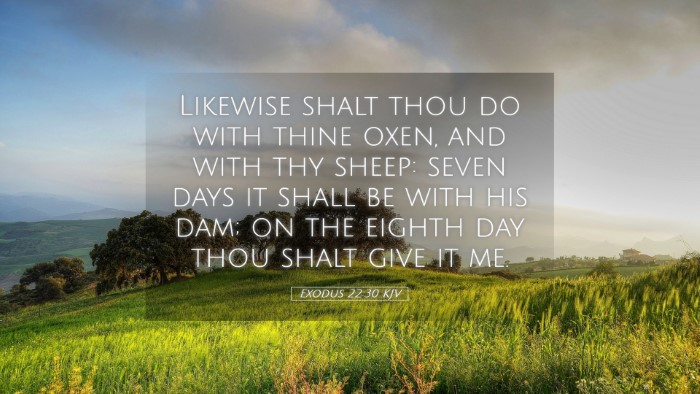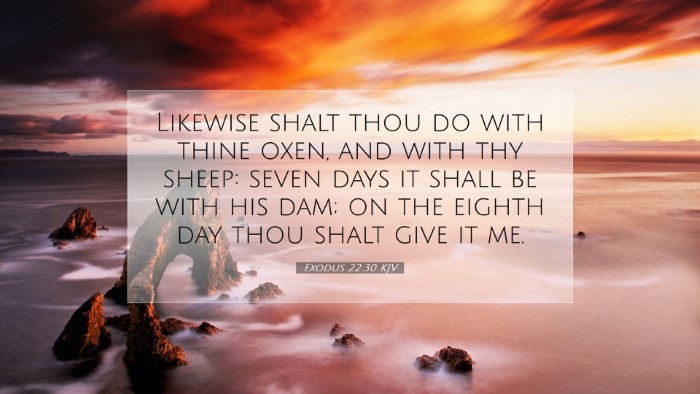Commentary on Exodus 22:30
Verse: Exodus 22:30 - "You shall be holy men to Me. You shall not eat meat torn by beasts in the field; you shall throw it to the dogs." (ESV)
Introduction
The commandment found in Exodus 22:30 embodies rich theological and practical dimensions, reflecting God's call to holiness and the principles of ceremonial purity. This text must be understood within the broader context of God's covenant with Israel, emphasizing the necessity for His people to maintain a distinct identity that reflects His character and will.
Holiness and Separation
Matthew Henry notes that the call to be "holy" signifies a separation from common practices that are inconsistent with God's nature. The phrase "You shall be holy men to Me" reflects God’s desire for a people set apart, emphasizing the relational aspect of holiness—being dedicated to God’s service.
Albert Barnes elaborates that the holiness required of the Israelites was not merely ceremonial but ethical and moral, urging them to embody integrity and righteousness in their daily lives. This inclination toward holiness marks a critical component of their covenantal identity, anchoring their conduct in God's commands.
Applications of Holiness
Adam Clarke discusses the implications of such holiness as it pertains to everyday life, stressing how the neglect of proper practices, like consuming carnage from wild beasts, symbolizes a deeper moral and spiritual decay. This reflects the broader theme that holiness should permeate various aspects of life—spiritual, moral, and dietary.
- Relational Aspect: The holiness demanded extends to communal relations, indicating a divine order that fosters a healthy society.
- Dietary Laws: The specific prohibition against consuming torn meat reflects the larger system of laws intended to guide the People of God, ensuring their physical and spiritual well-being.
- Spiritual Integrity: The failure to adhere to such commandments would lead to spiritual implications, distancing them from the sacred relationship with God.
The Danger of Defilement
Matthew Henry points out that God intends to protect His people from contamination by both dietary choices and communal lifestyles. The torn meat from wild beasts typifies things that are lifeless or decaying, which can lead to spiritual contamination for those who consume it. This idea is rooted in the ancient understanding that physical actions have spiritual ramifications.
Consequences of Disobedience
Disobeying such laws, as highlighted by Albert Barnes, invites not just punishment but also a loss of identity as God's chosen people. By embracing practices that are contrary to God's directives, the Israelites risk their status and the resultant blessings of being in covenant with Him.
Adam Clarke further explains that the consequences of such lapses extend beyond individual actions to affect the entire community, leading to collective defilement which could result in God's judgment. The community's actions reflect its loyalty or disloyalty to God, thus maintaining a collective identity rooted in holiness is crucial.
The Symbolism of the Dogs
The directive to throw the torn meat to the dogs introduces another layer of meaning. Matthew Henry explains that dogs, in the cultural context of ancient Israel, were seen as unclean. By throwing the torn meat to dogs, the passage illustrates the rejection of impurity and the assertion of holiness.
Albert Barnes suggests that this action signifies the categorization of certain elements as unworthy of the covenant people, thus reinforcing boundaries that define a holy lifestyle. The act of disposal to dogs reflects a careful discernment between what is sacred and profane.
Conclusion
In summary, Exodus 22:30 serves as a profound reminder of God’s call for holiness among His people. The command to refrain from consuming torn meat and to regard it as unclean is not simply a dietary code but a rich theological principle that encompasses ethical behavior, communal purity, and the understanding of one's identity in relation to God.
As Matthew Henry, Albert Barnes, and Adam Clarke elucidate, this passage encapsulates the essence of what it means to be 'holy unto the Lord' and underscores the broader implications that such holiness has for both individual lives and the collective life of the community.


